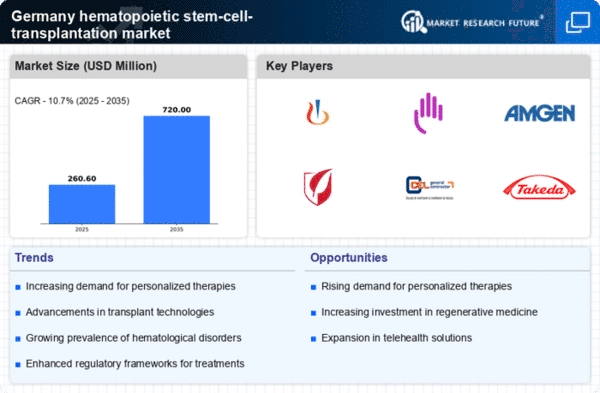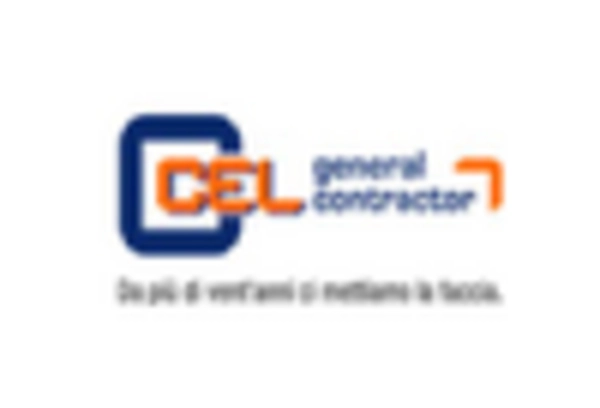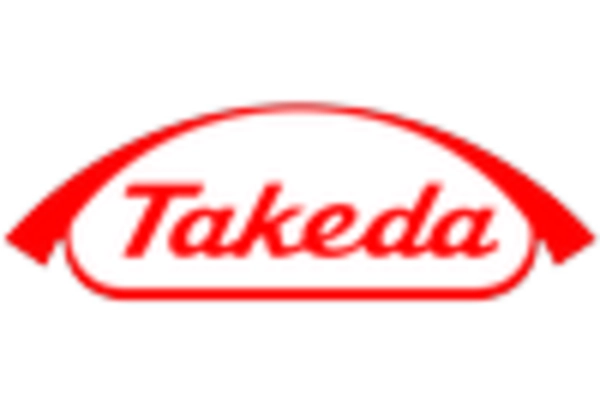Growing Demand for Personalized Medicine
The shift towards personalized medicine is emerging as a significant driver for the hematopoietic stem-cell-transplantation market. Patients are increasingly seeking tailored treatment options that cater to their specific genetic profiles and disease characteristics. This trend is particularly relevant in hematological disorders, where genetic variations can influence treatment efficacy. The market is witnessing a rise in the development of personalized therapies, which are projected to account for over 30% of the total treatment options by 2026. As healthcare providers adopt more individualized approaches, the demand for hematopoietic stem-cell transplantation is likely to increase, reflecting a broader trend towards personalized healthcare solutions in Germany.
Advancements in Transplantation Techniques
Innovations in transplantation techniques are significantly influencing the hematopoietic stem-cell-transplantation market. Techniques such as haploidentical transplantation and the use of umbilical cord blood are gaining traction, offering new avenues for treatment. These advancements enhance the success rates of transplants, which have reportedly improved by 15% over the past few years. Additionally, the development of less toxic conditioning regimens is making transplants safer for patients, thereby increasing their acceptance. As these techniques become more widely adopted, they are expected to attract more patients and healthcare providers, further propelling the market's growth in Germany. The ongoing research and clinical trials in this area suggest a promising future for the hematopoietic stem-cell-transplantation market.
Government Funding and Research Initiatives
Government funding and research initiatives play a pivotal role in shaping the hematopoietic stem-cell-transplantation market. In Germany, substantial investments are being made to support research in stem-cell therapies and transplantation methods. For instance, the government allocated approximately €50 million in 2025 for research aimed at improving transplantation outcomes. Such funding not only facilitates innovative research but also encourages collaboration between academic institutions and healthcare providers. This collaborative environment is likely to lead to breakthroughs that enhance the efficacy and safety of stem-cell transplants. As a result, the market is expected to benefit from these initiatives, fostering growth and development in the field of hematopoietic stem-cell transplantation.
Rising Incidence of Hematological Disorders
The increasing prevalence of hematological disorders in Germany is a crucial driver for the hematopoietic stem-cell-transplantation market. Conditions such as leukemia, lymphoma, and multiple myeloma are becoming more common, necessitating advanced treatment options. According to recent health statistics, the incidence of leukemia has risen by approximately 3.5% annually. This trend indicates a growing patient population that may require stem-cell transplantation, thereby expanding the market. Furthermore, advancements in diagnostic techniques have led to earlier detection of these disorders, which could potentially increase the number of patients eligible for transplantation. As healthcare providers seek effective solutions, the demand for hematopoietic stem-cell-transplantation services is likely to grow, driving market expansion in Germany.
Increased Collaboration Among Healthcare Institutions
Collaboration among healthcare institutions is becoming increasingly vital for the growth of the hematopoietic stem-cell-transplantation market. Partnerships between hospitals, research centers, and pharmaceutical companies are fostering innovation and improving patient outcomes. These collaborations facilitate the sharing of knowledge, resources, and best practices, which can enhance the quality of care provided to patients undergoing transplantation. In Germany, several major hospitals have formed networks to streamline patient referrals and optimize treatment protocols. This collaborative approach is expected to lead to more efficient use of resources and improved access to transplantation services, thereby driving market growth. The emphasis on teamwork in healthcare is likely to shape the future landscape of the hematopoietic stem-cell-transplantation market.
















